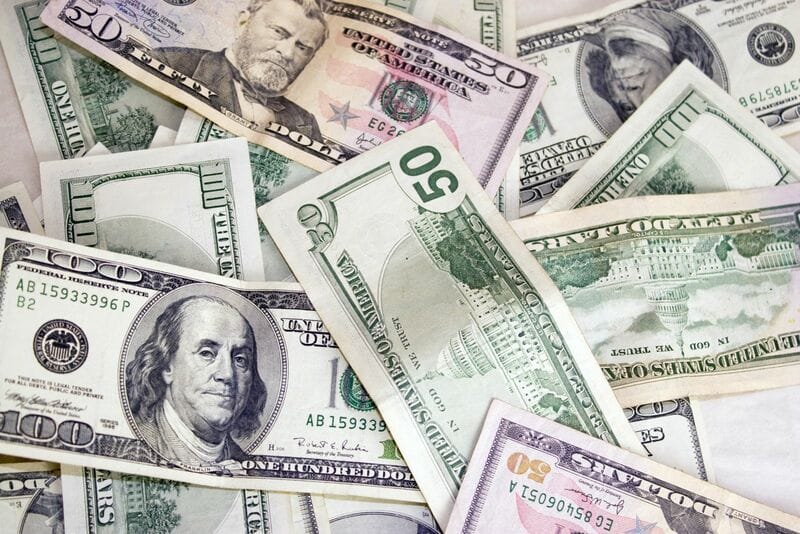
The dollar index (DXY00) on Tuesday rose slightly by +0.01%. Hawkish Fed comments from Fed Governor Bowman and Kansas City Fed President Schmid pushed T-note yields higher and supported the dollar. However, gains in the dollar were muted after the Conference Board’s U.S. Feb consumer confidence index unexpectedly declined.
Tuesday’s U.S. economic news was mixed for the dollar. On the positive side, the Jan capital goods new orders nondefense ex-aircraft and parts, a proxy for capital spending, rose +0.1% m/m, right on expectations. Also, the Dec S&P CoreLogic composite-20 home price index rose +6.13% y/y, stronger than expectations of +6.05% y/y and the largest increase in 13 months. On the negative side, the Conference Board’s U.S. Feb consumer confidence index unexpectedly fell -4.2 to 106.7, weaker than expectations of an increase to 115.0.
Hawkish Fed comments were supportive of the dollar. Fed Governor Bowman said that inflation will continue to decline with interest rates held at current levels, but it is "not yet time" to begin cutting rates. Also, Kansas City Fed President Schmid said, "With inflation running above target, labor markets tight, and demand showing considerable momentum, my own view is that there is no need to preemptively adjust the stance of monetary policy."
The markets are discounting the chances for a -25 bp rate cut at 3% for the March 19-20 FOMC meeting and 19% for the following meeting on April 30-May 1.
EUR/USD (^EURUSD) on Tuesday fell by -0.07%. The euro on Tuesday posted modest losses on some mixed Eurozone economic news after Jan M3 money supply rose less than expected and the German Mar GfK consumer confidence rose as expected. Also, a stronger dollar on Tuesday weighed on the euro.
Eurozone Jan M3 money supply rose +0.1% y/y, weaker than expectations of +0.3% y/y.
The German Mar GfK consumer confidence index rose +0.6 to -29.0, right on expectations.
Swaps are pricing in the chances for a -25 bp rate cut by the ECB at 4% for its next meeting on March 7 and 29% for the following meeting on April 113
USD/JPY (^USDJPY) on Tuesday fell by -0.11%. The yen moved higher Tuesday on the stronger-than-expected Japanese Jan consumer price report, which was hawkish for BOJ policy. Limiting gains in the yen Tuesday were higher T-note yields and the rally in the Nikkei Stock Index to a new record high, which curbed safe-haven demand for the yen.
Japan Jan national CPI eased to +2.2% y/y from +2.6% y/y in Dec, the smallest increase in 1-3/4 years but stronger than expectations of +1.9% y/y. Jan national CPI ex-fresh food and energy eased to +3.5% y/y from +3.7% y/y in Dec, the smallest increase in 11 months but stronger than expectations of +3.3% y/y.
Swaps are pricing in the chances for a +10 bp rate increase by the BOJ at 20% for its next meeting on March 19 and 76% for the following meeting on April 26.
April gold (GCJ4) on Tuesday closed up +5.2 (+0.26%), and Mar silver (SIH24) closed up +0.006 (+0.03%). Precious metals on Tuesday posted modest gains. The ongoing geopolitical risks in the Middle East and Ukraine have boosted safe-haven demand for precious metals. Silver garnered support from Tuesday’s news that the Dec S&P CoreLogic composite-20 home price index rose at its fastest pace in 13 months, a positive sign for industrial metals demand.
Gains in metals were limited after Japan’s Jan national CPI rose more than expected, which was hawkish for BOJ policy. Also, hawkish comments from Fed Governor Bowman and Kansas City Fed President Schmid pushed bond yields higher and undercut precious metals when they said there is no need to cut interest rates right now. Gold remains under pressure from the long liquidation of gold by funds after long gold holdings in ETFs fell to a 4-year low Monday.
On the date of publication, Rich Asplund did not have (either directly or indirectly) positions in any of the securities mentioned in this article. All information and data in this article is solely for informational purposes. For more information please view the Barchart Disclosure Policy here.






